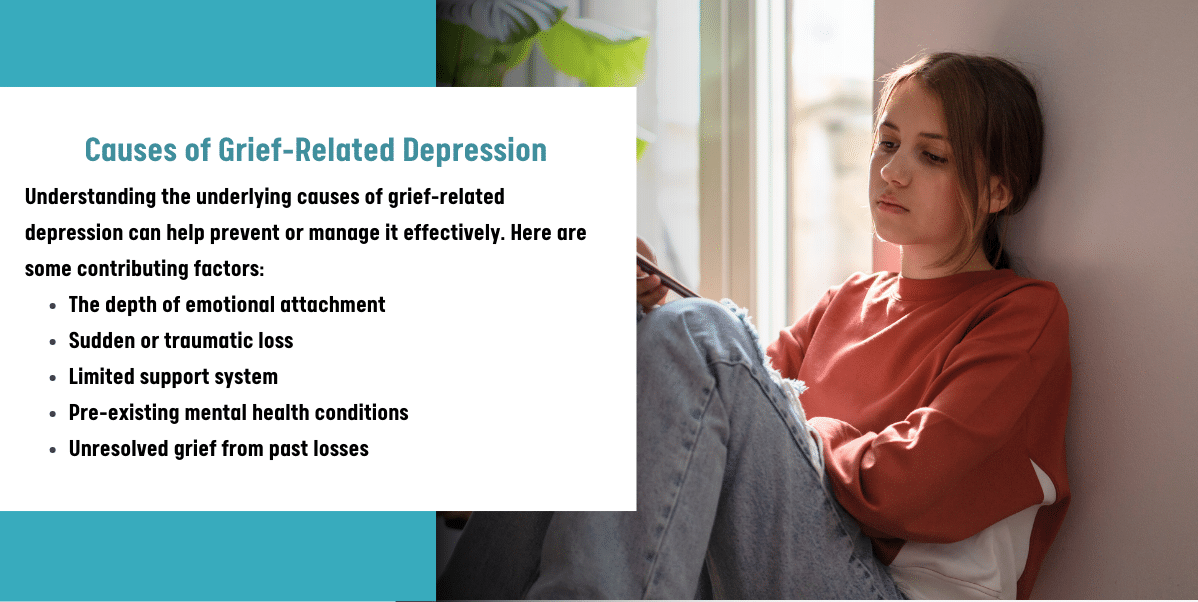
Mourning the loss of a loved one is one of life’s most profound and painful experiences. While grief is a natural response to loss, for some, it can lead to or intensify depression, leaving one feeling stuck in a cycle of overwhelming sadness and despair.
Grief-related depression often extends beyond typical mourning, with symptoms such as persistent hopelessness, lack of energy, difficulty concentrating, and withdrawal from loved ones. When these feelings linger and make it hard to function day-to-day, it’s important to seek support and explore available treatment options.
Transcranial Magnetic Stimulation (TMS) therapy offers a promising path forward for those struggling with grief-induced or exacerbated depression. Using gentle magnetic pulses to stimulate specific areas of the brain, TMS can help reduce depressive symptoms and offer a renewed sense of hope. If you or someone you know is navigating grief and depression, TMS may be worth considering for lasting relief.
Causes and Signs of Grief-Related Depression
Grief and depression can become intertwined for many people, especially after a profound loss. While grief is an expected emotional response, it can sometimes evolve into depression, making it difficult to cope with daily life.
Signs of Grief-Related Depression
Grief-related depression goes beyond typical mourning behaviors. Look out for these signs to identify if grief is turning into depression:
- Persistent sadness and hopelessness: Unlike the shifting waves of sadness in grief, depression brings a lingering sense of despair that feels impossible to shake.
- Loss of interest in activities: Someone who once found joy in hobbies or socializing may find little or no pleasure in them after developing depression.
- Physical symptoms: Fatigue, changes in appetite, frequent headaches, or digestive issues often occur alongside emotional distress.
- Difficulty concentrating: Struggling with focus, memory, or decision-making is a common hallmark of depression following grief.
- Social withdrawal: Isolation and avoidance of loved ones can signal that grief is deepening into something more serious.
- Thoughts of self-harm or death: Feelings of hopelessness or worthlessness may lead to dangerous thoughts, warranting immediate professional support.
Causes of Grief-Related Depression
Understanding the underlying causes of grief-related depression can help prevent or manage it effectively. Here are some contributing factors:
- The depth of emotional attachment: Losing someone you shared a deep emotional connection with can make grieving even more overwhelming and contribute to depression.
- Sudden or traumatic loss: An unexpected or violent loss can intensify emotional pain, leaving survivors more vulnerable to depressive symptoms.
- Limited support system: Without a strong network of friends or family, feelings of loneliness and hopelessness may take hold during grief.
- Pre-existing mental health conditions: Individuals with a history of anxiety or depression face a higher risk of developing grief-related depression.
- Unresolved grief from past losses: A new loss can resurface unprocessed emotions related to earlier bereavements, compounding the mental and emotional strain.
How Grief-Related Depression Affects Mental Health
Grief-related depression can profoundly impact mental health, extending far beyond the initial pain of loss. While grief is a natural response, when it evolves into depression, it can disrupt emotional well-being and cognitive functioning, leaving individuals feeling overwhelmed and unable to heal.
This type of depression often clouds a person’s ability to process their emotions or memories in a healthy way. Instead of gradually adapting to life without their loved one, they may remain stuck in a cycle of despair. Depression can also distort self-perception, leading to persistent guilt, feelings of worthlessness, or believing the loss was somehow their fault.
Cognitively, grief-related depression can interfere with focus, decision-making, and memory. Everyday tasks may feel insurmountable, and individuals often experience mental fatigue or a sense of detachment from reality. Over time, this strain can decrease resilience, making it harder to manage stress or rebuild a sense of purpose.

Coping with Loss and Grief
Grief is a personal process that varies for everyone, as the experience of losing someone close can feel overwhelming. While there is no one-size-fits-all approach to healing, adopting healthy coping strategies can provide emotional support and help rebuild balance over time.
By exploring ways to address your feelings and care for yourself, you can take steps toward honoring your loved one while finding resilience.
Seek Social Support
Reaching out to friends or family members you trust can make a significant difference in processing grief. Sharing your emotions in a safe environment allows you to release the weight of sorrow and feel understood.
For some, joining a support group with others who have faced losses can offer comfort through shared experiences, breaking the sense of isolation that grief often brings.
Take Care of Your Physical Health
Grief can take a toll on your body as well as your mind, making self-care essential. Maintaining a consistent routine, even when it feels challenging, provides a foundation of stability.
Incorporating physical activity and nourishing meals into your day can naturally improve your mood and energy, helping you face each hurdle with a little more strength.
Express Your Feelings
Finding ways to express your emotions can bring clarity and relief. Writing in a journal allows you to reflect on your thoughts and feelings privately, helping you process them gradually.
Engaging in creative hobbies such as painting or playing music can offer a constructive outlet for your grief, while also creating moments of peace and reflection.
Overall, coping with loss takes time and patience, but these healthy approaches can guide you on a path toward healing. Each small step helps you move closer to finding equilibrium amid the waves of grief.
TMS Therapy for Grief and Depression Treatment
Transcranial magnetic stimulation (TMS) has emerged as a groundbreaking, FDA-approved treatment for depression, offering hope to individuals struggling with grief-related depression when other methods fall short.
Unlike medications or traditional talk therapy, TMS directly targets the brain’s activity by using magnetic pulses to stimulate areas associated with mood regulation. This innovative approach provides a non-invasive way to tackle depressive symptoms, especially for those who have not found relief through conventional treatments.
One of the benefits of TMS for depression lies in its ability to address treatment-resistant depression. For individuals experiencing prolonged and debilitating grief that has turned into clinical depression, TMS can offer a new pathway to healing.
It works by reactivating underperforming neural pathways, gradually alleviating symptoms like persistent sadness, apathy, and lack of motivation. Another benefit of TMS for depression is that this treatment option does not involve the systemic side effects often associated with medications, such as weight changes or drowsiness.
Many who have undergone TMS for depression report feeling a renewed sense of hope and emotional balance, providing an opportunity to process their grief with greater mental clarity. While TMS is not a quick fix, its proven effectiveness has made it a valuable option in the fight against depression. For those seeking alternative solutions, TMS stands out as a beacon of possibility for recovery.
Additional Resources for Grief-Related Depression
Navigating grief-related depression can feel overwhelming, but you don’t have to face it alone. My TMS offers a range of supportive services that can help individuals find strength and healing during these difficult times.
Counselling/Therapy
Professional counselling or therapy offers personalized guidance to address the unique emotions that grief can bring. At My TMS, licensed therapists provide a safe and compassionate space where you can explore your feelings and work through the challenges of grief.
Therapy sessions are tailored to meet your individual needs, whether you’re struggling with sadness, anger, or feelings of isolation. Through these one-on-one conversations, you’ll gain valuable tools to process loss, rebuild your emotional foundation, and create a pathway toward recovery.
Counselling is a vital resource for learning to cope in healthy ways while receiving the emotional support you deserve.
Support Groups
Sometimes, the most comforting help comes from connecting with others who share similar experiences. My TMS offers grief support groups designed to foster a sense of community and understanding.
These groups provide a space to openly share your thoughts and emotions, learn from others’ journeys, and strengthen your connection. The shared understanding among group members helps combat the loneliness that often accompanies grief, making it a powerful resource for healing.
Seeking these additional resources at My TMS can be a meaningful step toward overcoming grief-related depression and finding hope and balance once again.
Book a Free Appointment with My TMS Today
If you or someone you care about is struggling with grief-related depression, know that help is just a step away. My TMS offers a proven, FDA-approved alternative treatment option that can provide relief when other methods haven’t worked. Using cutting-edge technology, TMS therapy focuses on addressing the root causes of depression to help you find clarity, balance, and hope.
It’s time to take control of your mental health and explore a solution that truly works. Call us today at (877) 548-8081 to book a free appointment or fill out our online contact form. Our team is here to answer your questions, guide you through the process, and ensure you receive personalized care from the moment you reach out. Don’t wait. The first step toward healing could be the easiest one you make. Connect with My TMS today and start your journey toward recovery.


